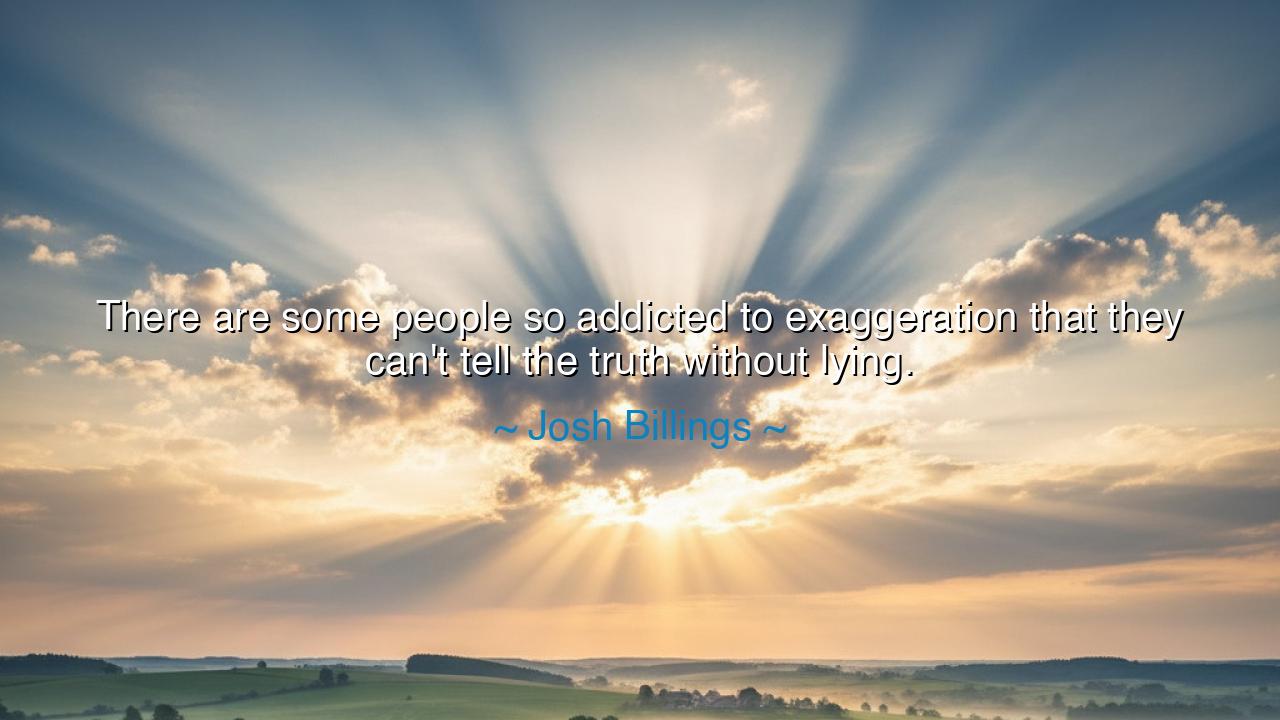
There are some people so addicted to exaggeration that they
There are some people so addicted to exaggeration that they can't tell the truth without lying.






Josh Billings, the humorist and sage of plain speech, once warned with sharp wit: “There are some people so addicted to exaggeration that they can’t tell the truth without lying.” Behind the humor lies a grave insight into the frailty of human character. Billings knew that exaggeration, when practiced long enough, ceases to be a flourish of words and becomes a habit of being. A man who embellishes everything eventually loses sight of reality itself; his tongue grows incapable of uttering plain truth without dressing it in deception.
The meaning of this quote is twofold. First, it reminds us that exaggeration, though small in appearance, is a dangerous seed. A story stretched for effect, a boast inflated for applause, a detail colored for drama—these may begin as harmless acts. But repeated, they form a pattern, and the pattern becomes identity. What begins as a tool for amusement becomes a prison, until the speaker can no longer separate truth from lie. Second, it warns us that truth is delicate: once polluted by exaggeration, it loses its power and becomes suspect, even when sincerely spoken.
History offers examples of this truth. Consider the boy in Aesop’s fable who cried wolf. His exaggerations—his false alarms—were not meant as great deceptions but as amusements. Yet in time, his habit destroyed trust. When at last the wolf came in reality, his truth was taken as another lie, and the cost was destruction. In this ancient tale, we see Billings’ wisdom: exaggeration corrodes credibility until even truth itself sounds false.
In more recent history, think of politicians who make grand promises, gilded with exaggeration. Their words may stir crowds for a season, but when those promises fail to match reality, their names become synonymous with deceit. Once the habit of exaggeration takes hold, it is no longer possible for them to be believed, even if they later speak with sincerity. The people learn to weigh their words lightly, for exaggeration has made truth indistinguishable from lying.
Billings’ observation also speaks to the soul itself. A person who cannot speak plainly has lost intimacy with truth, and such a loss deforms the spirit. Truth is strength, clarity, and honor; exaggeration is weakness, fog, and vanity. To abandon truth for the addiction of exaggeration is to trade gold for tinsel, substance for shadow. And in time, the addict does not even know he has done it—he is caught in a web of his own weaving.
The lesson is luminous: guard the tongue, for it shapes the soul. Speak truth with simplicity, without adornment for vanity’s sake. If you embellish, let it be known as art, not deception. Do not let exaggeration become habit, for habit will shape destiny. Remember that the trust of others is a treasure: once squandered, it is hard to reclaim.
Practical actions follow naturally. Train yourself to check your words. Before speaking, ask: Am I telling this as it is, or am I distorting it for effect? Seek the discipline of honesty in small things—measurements, accounts, descriptions—so that when greater truths must be spoken, your voice carries weight. Praise without excess; promise only what you mean; describe without false coloring. In time, your speech will gain the rare power of credibility, and your word will be trusted as bond.
Thus, Josh Billings’ humor carries the fire of wisdom: “There are some people so addicted to exaggeration that they can’t tell the truth without lying.” Let us not be among them. Let us instead be men and women of straight speech, whose words need no inflation, for their strength lies in their truth. In this way, the tongue becomes not an instrument of deceit, but a vessel of integrity.






PQTien Pham Quynh
Billings’ statement made me think about how exaggeration affects the credibility of a person. If someone exaggerates, even unintentionally, it creates a gap between what they say and the reality of it. How does this habit of exaggeration impact relationships and communication? Can we ever truly trust someone who has a tendency to embellish, or is there always a sense of skepticism when they speak?
Bb.nhi
The idea that some people can’t tell the truth without lying because they’re addicted to exaggeration seems very accurate. It makes me question whether exaggeration is a form of insecurity or a habit that becomes so ingrained that it’s hard to stop. How much does exaggeration actually affect our ability to have honest conversations? Can someone who constantly exaggerates still be seen as truthful, or does it always raise doubt?
PCphong can
Billings’ quote suggests an interesting paradox—those who exaggerate can’t even tell the truth without distorting it. It makes me wonder, does exaggeration stem from a lack of confidence in the simple truth? Why do some people feel the need to make the truth sound more impressive than it is? Can we ever trust a person who consistently exaggerates, or does it show a deeper issue with their relationship to reality?
NTNguyen Truc
This quote really makes me think about how exaggeration can undermine trust. If someone exaggerates even when they mean well, how do we know when they are actually telling the truth? Does exaggeration come from insecurity or a deep-seated need for validation? Can a habitual exaggerator even recognize the line between truth and embellishment? How do we deal with people who blur this line constantly?
CH8A1 Nguyen Cong Hieu
Josh Billings’ quote makes me reflect on how exaggeration can distort our understanding of truth. It’s interesting how some people feel the need to embellish even when they’re telling the truth. Why is it so hard for some to just stick to the facts? Is it a desire for attention, or do they genuinely believe that exaggerating makes their stories more engaging? How can we encourage more authenticity in communication?